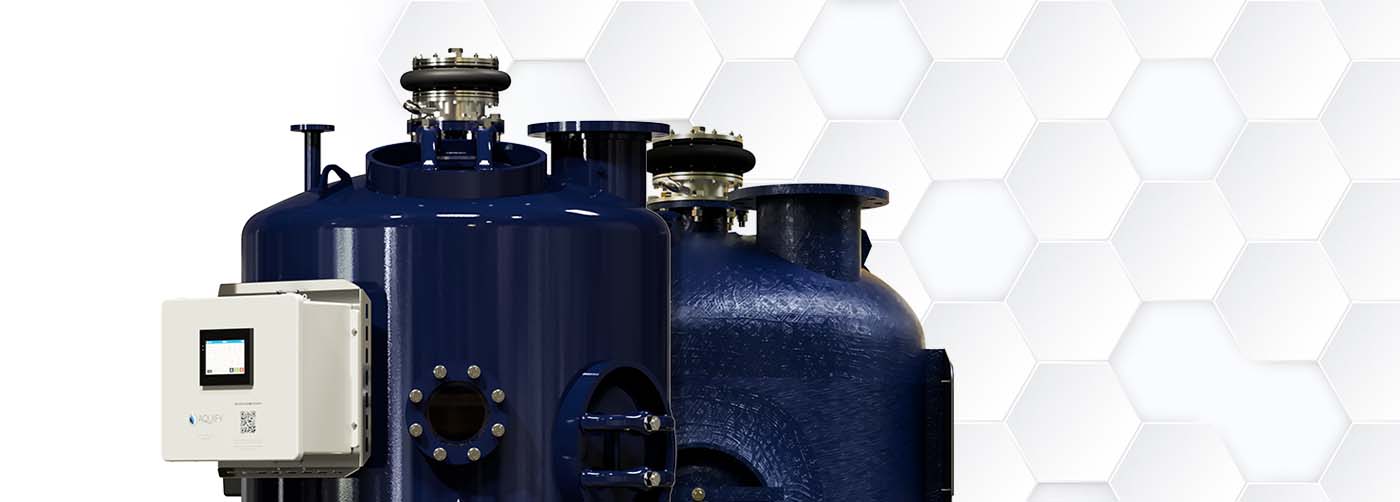When building an aquatic system for a commercial or residential project, the multiple types of commercial pool filters available today add a level of complexity to the design process. Should you go with a regenerative media filter or high-rate sand? Is stainless steel or fiberglass a better option? What about cartridge filters or ones that use diatomaceous earth (DE)?

Although there’s not necessarily a right or wrong answer to these questions, there’s a variety of criteria that impact your choice of filter: total volume of your facility’s pools, square footage of the mechanical room, required turnover rate for your pools, available budget, to name a few.
Let’s take a look at one of the many factors in the filter selection process: the type of tank material. While both stainless steel filters and fiberglass filters can be excellent options for your aquatic project, consider the following:
Design parameters
Stainless steel filters offer greater flexibility for custom fabrications compared to fiberglass filters, which tend to be “one-off” molds. If you encounter space limitations in the mechanical room or need to make alterations down the road, stainless steel filters are more adaptable to change.
Weight is another consideration when choosing a pool filter. Since fiberglass is one-third lighter than stainless steel, fiberglass filters are easy to ship and install. It’s worthwhile noting that although fiberglass is lighter than steel, its higher strength-to-weight ratio means it’s just as strong.
Height may also play a role in the decision-making process, particularly if you’re facing space constraints in the mechanical room. Aquify fiberglass filters are anywhere from 15” to 20” shorter than their stainless steel counterparts.
Some clients are concerned about the appearance of the filter, especially if being used in a residential project or if the filter will be visible to the public. If aesthetics is a factor, stainless steel filters can look sleek and high-end, while fiberglass filters tend to have a rougher, unpolished appearance.
Environmental impact
Aquatic designers, pool contractors, and facility owners are recognizing the importance of making environmentally-friendly and eco-efficient choices when designing an aquatic project. Similarly, more and more customers are choosing to spend their money with organizations that value sustainability in their approach to delivering products and services. Recreational pools and aquatic centres are not immune to this growing shift in demand, whether installing pool equipment that saves energy and limits water consumption or ensuring the air and water quality of the facility meet the highest environmental standards.
Stainless steel is a cradle-to-cradle (C2C) material. The C2C model promotes the use of construction materials and products that are 100% recyclable, or preferably, can be up-cycled. Existing within a closed cycle, stainless steel has the ability to be melted down and reused in an endless lifecycle of products.
Stainless steel filters are an environmentally-responsible choice in support of regenerative design and are ideal for LEED design projects or any aquatic project with an environmental impact or sustainability goal. Conversely, while fiberglass is designed to be durable and long-lasting—a positive quality in product design—, it doesn’t decompose. This means that when it’s time to upgrade your pool equipment, the old fiberglass filter will sit in a landfill forever.
Maintenance
When selecting the filter for your next project, consider the labor requirements for repairs. For stainless steel filters, you’ll need a skilled welder who understands the finishing requirements of stainless steel to maintain its corrosion protection (i.e., passivation).
For a fiberglass filter, you’ll need a skilled fiberglass repair person who is competent in fiberglass pressure vessel repair. Some fiberglass reinforced plastic (FRP) tanks may not be able to be repaired in all cases, due to the nature and type of construction (e.g., fiber-wrapped shell).
You can expect filter repairs to be similar to a boat. Stainless steel parts need to be maintained more frequently but require less specialization, while fiberglass repair is typically more specialized but less frequent.
Aquatic environment
Are you working with a salt water or chlorine pool? While both salt water and chlorine systems are harsh environments for aquatic equipment, from a corrosion engineering perspective, the effects of a salt water environment are more pronounced and create an additional level of corrosion on the metal parts. Simply stated, saltwater pools require very high quality equipment and special care for each component in the system, regardless of material type.
While no material is 100% resistant to corrosion, a high-quality stainless steel or fiberglass tank will help reduce corrosion concerns. If selecting a stainless steel filter, the use of a sacrificial anode will dramatically reduce the galvanic corrosion effects, both in chlorine and salt water environments.
Budget
Budget is always top of mind when designing an aquatic system and the mechanical room equipment comprises a significant portion of the total cost of the project. For contractors looking to find ways to minimize costs without compromising quality, fiberglass pool filters may be a better, more affordable option. Stainless steel aquatic filters are generally considered to be a premium filter which means they often come with a higher price tag.
Decision Time: Selecting Your Pool Filter
Although it may seem like a lot to think about, choosing a filter that meets the unique demands of your environment, budget, and design requirements will be a huge advantage, both from an operational perspective and for the patrons using your facility. While filtration range varies depending on the type of filter (e.g., high-rate sand, regenerative media) and choice of media (e.g., sand, DE, perlite), both stainless steel and fiberglass filters can provide excellent water clarity and quality for many years to come.
Whatever filter your project demands—stainless steel regenerative media, fiberglass regenerative media—Aquify has a solution for you.
